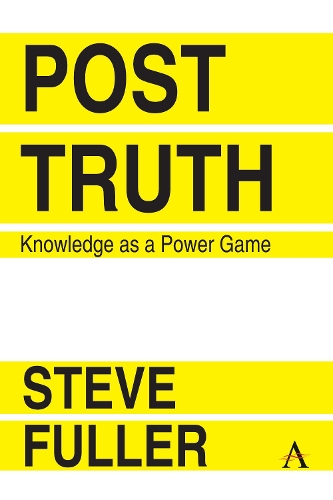
Post-Truth: Knowledge As A Power Game
(Hardback)
Available Formats
Publishing Details
Post-Truth: Knowledge As A Power Game
By (Author) Steve Fuller
1
Anthem Press
Anthem Press
18th June 2018
United Kingdom
Classifications
Professional and Scholarly
Non Fiction
Sociology
301
Physical Properties
Hardback
218
Width 153mm, Height 229mm, Spine 26mm
454g
Description
'Post-Truth' was Oxford Dictionary's 2016 word of the year. While the term was coined by its disparagers, especially in light of the Brexit and US Presidential campaigns, the roots of post-truth lie deep in the history of Western social and political theory. This book reaches back to Plato, ranges across theology and philosophy, and focuses on the Machiavellian tradition in classical sociology. The key figure here is Vilfredo Pareto, who offered the original modern account of post-truth in terms of the 'circulation of elites', whereby 'lions' and 'foxes' vie for power by accusing each other of illegitimacy, based on allegations of speaking falsely either about what they have done (lions) or what they will do (foxes). The defining feature of 'post-truth' is a strong distinction between appearance and reality which is never quite resolved, which means that the strongest appearance ends up passing for reality. The only question is whether more is gained by rapid changes in appearance (foxes) or by stabilizing one such appearance (lions). This book plays out what all this means for both politics and science.
Reviews
Article by Professor Fuller published in the Blog of the APA
Steve Fuller takes the concept of post-truth to a new level of analysis, explaining the history of meta thinking about truth, the institutional structuring of truth through rules of the game, and the forms of knowledge that go beyond and problematize this kind of truth. Fuller skewers contemporary thinkers who are in denial about the problematic character of institutional truth and wish to occlude or ignore the processes by which it is produced, and who invent philosophical rationalizations for this denial. This is a readable, bravura performance that develops themes from his earlier writings.
Stephen Turner, Distinguished University Professor, University of South Florida, USA
Alfred Jarry said, Cliches are the armature of the Absolute. Steve Fuller provokes us to think past clichs about truth that we default to in the face of scepticism about expertise. He provides an account of issues in play in post-truth, epistemic populist circumstances, and traces their lineage in an illuminating way.
Fred DAgostino, Professor of Humanities, The University of Queensland, Australia
Anyone familiar with the work of Steve Fuller will expect Post-Truth: Knowledge as a Power Game to be original, provocative, and, of course, funny. It is all these things.
Sharon Rider, Postdigital Science and Education, April 2019, Vol 1 (1): pp. 256264.
Fuller carries social constructionism to its bitter end in his theory of the post-truth conditionendemic to current life and to the entirety of Western Philosophy.
Sheldon Richmond, Book Review, 'Philosophy of the Social Sciences', 49 (1): pp. 6984.
"The book offers analyses of how the post-truth condition manifests itself in a breadth of situations and settings. Overall, it presents a compelling argument that the world immersed in the post-truth condition is not on the brink of apocalypse. Fullers open-minded inquiry casts a glance beyond the point where most publications on post-truth halt. Where most resort to categorical disdain, he takes a step back to consider the big picture. In this way, his book presents a unique endeavor and a valuable contribution to post-truth scholarship. Toman, Lucia: A Different Perspective on Post-Truth: Lions, Foxes, Academia and Brexit [Review of: Fuller, Steve: Post-Truth. Knowledge as a Power Game. New York: Anthem Press, 2018.]. In: KULT_online 62 (2020)."
Author Bio
Steve Fuller is Auguste Comte Professor of Social Epistemology at the University of Warwick, UK.
